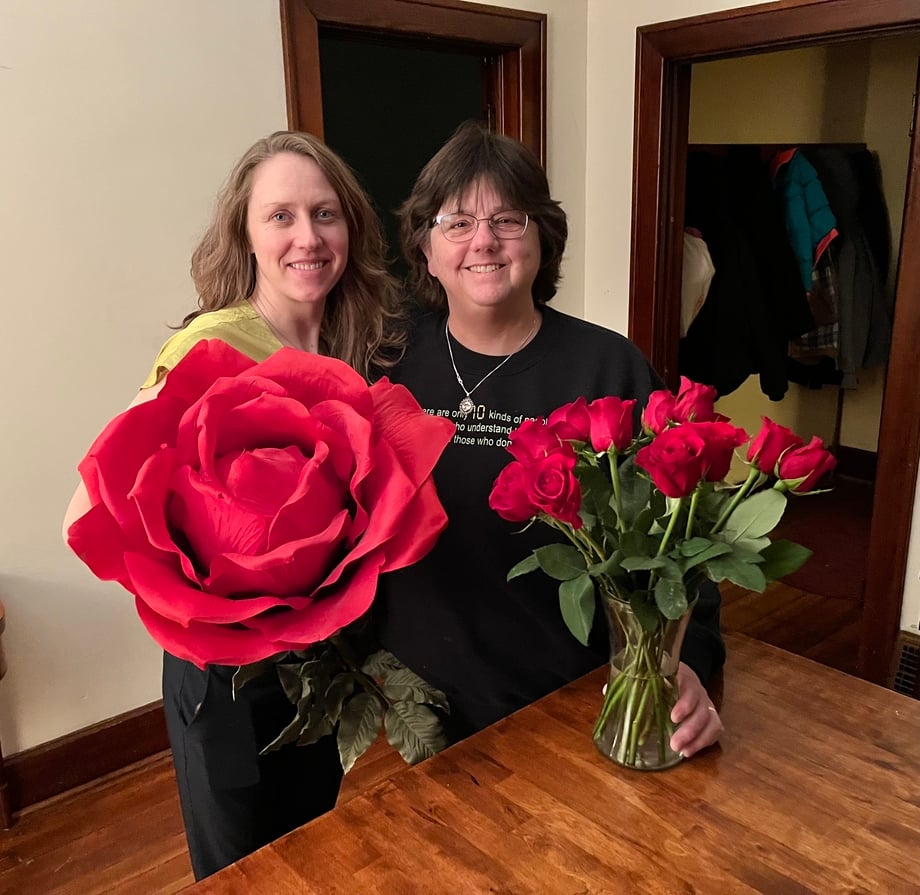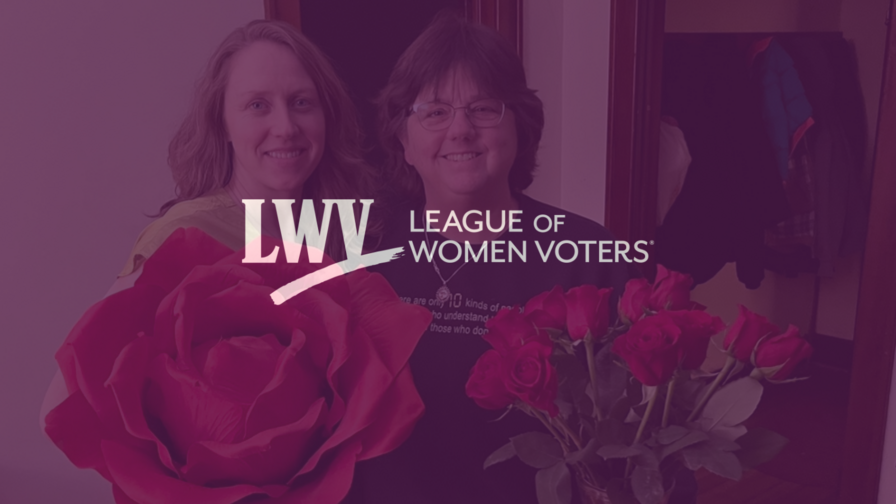The Mother and Daugher Duo Leading LWV Nebraska
Who taught you to advocate for a more equitable world? For many of us, the answer is someone in our family. That's the case for these League members, Claudia and Janelle Stevenson. Claudia and Janelle are not only mother and daughter, they're also co-presidents of the LWV of Nebraska.

LWV of Nebraska co-presidents Janelle and Claudia Stevenson (left to right)
We asked Janelle and Claudia what the League means to them, what it's like to work together, and what they'd recommend to other families looking to fight the good fight hand in hand!
What does the League mean to your family?
Claudia Stevenson: When my daughter told me five years ago that she joined the LWV, I was so very proud. My mother had been a member, and I always thought I would be a member, but I live in a very rural part of Nebraska with no leagues around. So, when my daughter joined, I joined in my heart. Then she told me that I could be a member-at-large.
Janelle Stevenson: I learned that my grandmother was involved in a League in Ohio after I joined the board in 2019. It did not surprise me that she was a member as she has always been civically engaged. I was delighted to find that I had followed in her footsteps, inadvertently continuing my legacy, along with my mother.
To become a League member, join one of the 750+ state and local Leagues.
What is one of your favorite memories of working with or observing one another within LWV?
CS: When I joined, Janelle asked me to be on the Natural Resources Action Team. She was the co-director at the time. She shared the Nebraska Program info with me, and I noticed that there was nothing in the program about soil health. I asked her if I could write something about soil health — I am a retired resource conservationist with USDA's Natural Resources Conservation Service, and soil health was a big part of my career.
She said that our team would need to write a paper and present it to the local Leagues and the board to be approved and added to the Program. We did more than write a paper — our group of five created a PowerPoint presentation, which we presented to the board and the four local Leagues. Our information was approved and added to the Program.
JS: I believe this addition was timely as more experts, producers, and everyday people have learned that biologically diverse plant coverage aids give us healthy soils, which provide us with nutrient-rich foods and functioning ecosystems.
[Additionally,] we have recently been having one-on-one meetings with all of our directors and co-directors. This has helped us both as we continue to learn, and I believe connecting with each of the directors has shown that we value their expertise in this organization of people who care about basic human rights and civic engagement. I'm thankful we are all in this together.
What have you learned from one another?
CS: She has a great heart for people and the planet. I appreciate hearing her perspectives on the environment and on women's rights or the taking away of women's rights.
JS: I have learned that having a co-president is necessary. I have really valued my mother's organizational skills, and how she largely employs spreadsheets to keep track of our calendar, goals, events, volunteer time, etc. She has made many things happen quicker by just calling people, getting the information, and not convoluting it with more emails. My mother has always been involved in her community because she cares about the wellbeing of other people. I hope to do the same on a daily basis and not lose sight of the value of empathy and kindness despite a harsh world.
What advice would you give parents and children who want to work together?
CS: We take time to listen to each other. We write well together and understand the extra time needed to be co-presidents. I know her work schedule, and with the enormous amount of emails, I try to text her about time-sensitive issues.
JS: I think respecting each other's intersectional identities is important, as well as understanding the generational gap that will likely exist. Our experiences and perspectives are, of course, different, but each is valuable in learning about our past and future.
Anything else you'd like to share?
CS: I am proud to be a third generation to join the League of Women Voters. In the 1970s – 1980s, my mother was a member in West Carrollton, Ohio. She was in the founding group. I was always proud of her interest in the laws and equality. It is why I wanted to be a LWV member. It was my daughter that got me involved. I also became the co-director, and director of Natural Resources and Energy, following in my daughter's footsteps. Then became co-president like her.
JS: When I was ten years old, I was in the backseat of the car my mother was driving. She saw a young lady throw a piece of trash on the ground outside the Ogallala's local library. She stops the car, rolls down her window, and says, "Hey, pick that up and put it in the trash can." I sunk in the backseat to hide my face from the window. Fast forward 15 years later. I'm biking on 18th and F in Lincoln. I see this young boy throw a piece of trash on the ground. I said, "Hey, pick that up and throw it in the trash!" As I biked away, I laughed and thought, "I am my mother's daughter. She has taught me well."
The Latest from the League
You may consider yourself a history buff, but how well do you know the women who shaped our democracy? Test your knowledge and learn a thing or two with this quiz!
The ERA has a long history of champions who aimed to achieve “equality of rights under law” for people of all sexes in our Constitution. In honor of its 100th anniversary, we offer a look back at their work, how the ERA progressed, and where we are in the fight for equality.
On this day in 1920, the 19th Amendment was ratified, bringing a hard-fought campaign to allow women the right to vote to a conclusion.
Sign Up For Email
Keep up with the League. Receive emails to your inbox!
Donate to support our work
to empower voters and defend democracy.





